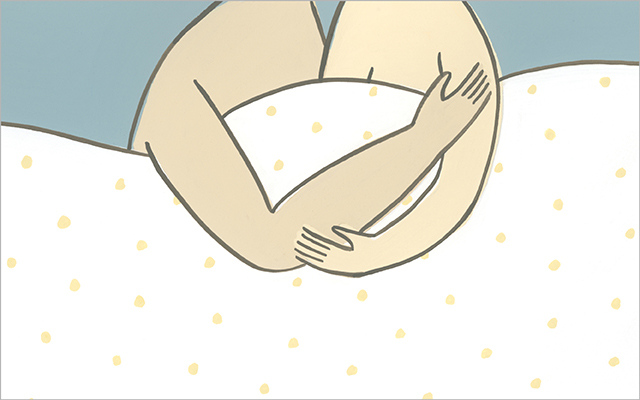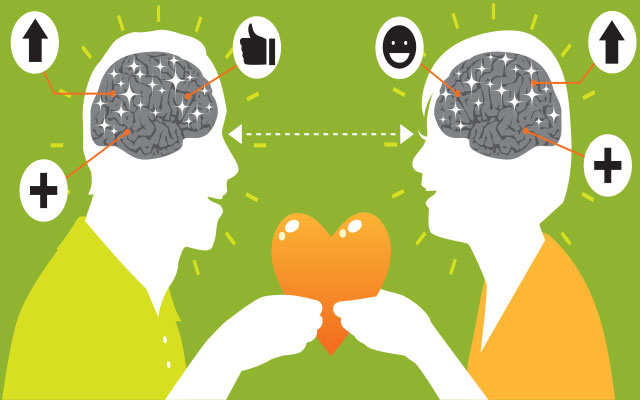I gave a talk at a conference recently — the kind of talk I give all the time, about how couples can sustain strong sexual connections over multiple decades. People came up to me afterward and told me how helpful it was, how normalizing, how practical. Then, later that evening, I sat around a table with a group of women who had attended the event. We were drinking chardonnay and talking about sex — of course — when the woman across the table from me suddenly leaned forward and said, “But let’s be real, Emily. Sometimes it’s just not there. You don’t want it. And nothing on Earth can make you want it.”
“True,” I said.
“It doesn’t matter how much you love your partner,” she said. “Sometimes it’s just not there.”
“Yup,” I agreed. “Sometimes.”
“So . . .” she hesitated, her eyes filling with tears. “Where does it go?”
“And how do you get it back?” asked someone else, so quietly I couldn’t tell who it was. Around the table, heads were nodding.
Loss of desire isn’t just loss of sex. When desire diminishes, people wonder if there’s something wrong with them, and they feel as if they’re losing themselves. Or that there’s something wrong with their partner, and they’re losing their partner. Or they worry about the relationship and losing the love that bound them to this person in the beginning. Loss of desire begins to feel like loss of connection.
Yet a bajillion things can interfere with sexual desire, and only rarely is it because there’s anything “wrong.” Almost always, it’s neither you nor your partner, nor is it the relationship. To find the problem, you have to zoom out and look for a factor in the larger context that’s standing between you and your own sexual well-being.
And the single most common factor?
Stress.
Which is the bad news. Because everyone has stress.
But here’s the good news: Everyone can do something about it. And when you do, your sexual desire can come roaring back to life.
I want to tell you what I told those women that night and what I tell everyone — regardless of gender — who asks me, so that you too can recognize when stress has hijacked your interest in sex, and know how to get the desire back.
The Mind Matters
The first thing to understand is how sex actually works in the brain.
The brain has a sexual accelerator, or “gas pedal” — technically called the sexual excitation system — designed to notice all the sexually relevant stimuli in the environment. Anytime you see, hear, smell, touch, taste, or (crucially) imagine something that your brain codes as associated with sex, it sends a “turn on” signal.
It’s happening right now. The fact that you’re reading about sex is, just a little, sexually relevant. The smell of your partner’s skin, fresh from the shower. The sensation of that person’s lips on your shoulder. The memory of that time that person did that lovely thing to you. These are all sexually relevant stimuli.
Your brain also has a sexual “brake” — the sexual inhibition system. It’s not inhibition as in shy; it’s inhibition as in slowing down. The brake, too, is scanning the environment for everything you see, hear, smell, touch, taste, or imagine that it codes as a good reason not to be turned on. The kids are awake in the next room. You’re frustrated about work. You’re annoyed with your partner. You’re unhappy with your own body.
The standard advice for people struggling with sexual arousal, desire, or orgasm is to increase stimulation to the accelerator: add role-play, toys, erotica (which are great if you enjoy them). But when people are struggling, it’s rarely because there’s not enough stimulation to the accelerator. The problem is almost always that there’s too much stimulation to the brake.
All kinds of things can hit the brake: Relationship issues, trauma history, and body-image stuff are all key offenders. But the most common culprit — and the foundational condition the others activate — is stress. Stress from your job or family. Stress about your relationship. Stress about your own body. Stress from worrying about sex!
Know that it’s completely normal for your sexual response to require more time and effort when you’re stressed, because stress is hitting your brake. You’re not broken; this is the sexual-response mechanism in your brain working appropriately in an inappropriate world.
So, imagine you’re trying to drive a car . . . with the hand brake on. You might eventually get where you want to go, but you’ll take a lot longer, burn a lot more fuel, and maybe even damage the engine along the way.
Plus, in the accelerator–brake design of your sexuality, the frustration and judgment of Why is this taking so long?! Isn’t it supposed to be easier than this? adds even more pressure to the brake, so you slow down even more.
The first tip is this: Know that it’s completely normal for your sexual response to require more time and effort when you’re stressed, because stress is hitting your brake. You’re not broken; this is the sexual-response mechanism in your brain working appropriately in an inappropriate world.
Ironically, the more patient you are with yourself, the more readily your brake will release. The rest is about effectively offloading your stress.
“Sure, Emily,” you say. “I’ll manage my stress better. Piece of cake.”
Actually, it kind of is — once you know how stress works.
Understanding Stress
You’re probably familiar with the fight-or-flight stress response that involves adrenaline and cortisol and all the rest of it. What most people leave out, though, is that the stress response isn’t just a response; it’s a cycle. Like this:
Suppose you’re living in the African savanna, the environment where humans evolved many thousands of years ago. You’re there, minding your own business, when you spot a lion charging you. Instantly your body is flooded with stress hormones that prepare it for what happens next — which is, you run.
At this point, there are only two possible outcomes, right?
1) You could be eaten by the lion, in which case your sex life is no longer a problem.
2) Or you survive! Maybe you run back to the village, shouting for help, and everyone comes out and slaughters the lion, saving you. You and your loved ones enjoy a feast of roast lion. The next morning, hand in hand with people you love, you bury the parts of the carcass you won’t be using, giving thanks to the lion for its sacrifice.
That is the complete cycle: Alert! Action! Safety! Celebrate!
Fortunately, these days we are almost never chased by lions.
Unfortunately, however, our bodies respond to modern stressors more or less the same way they would if we were being chased by a lion. Horrible business meeting? Chased by a lion. Fight with your partner? Chased by a lion. Onslaught of toxic self-critical thoughts about your body when you try on a pair of jeans? Chased by a lion.
Since activation of the stress-response cycle is about survival, it makes perfect sense that all of these experiences hit the sexual brake. After all, suppose you’re in the process of running away from the lion, and your certain special someone says, “Hey, sweetie, would you like to have some sexytime tonight?”
Your response is probably something like, “Are you kidding me? How about you help me with this lion?!” Or, in 21st-century terms: “How about you help me with these kids/bills/dishes/social injustices/existential crises?!”
We are all in the middle of a lot of activated, incomplete stress-response cycles, and they’re keeping our brakes on. That’s the problem.
The solution is to get out of survival mode, complete the cycle, and release the sexual brake.
(For more, see “Complete the Stress Cycle.”)
Complete the Stress Response
One approach that absolutely does not work to complete the cycle is telling yourself to calm down once the stressor is gone. Dealing with the stress is a separate process from dealing with the stressor; until you’ve dealt with the stress itself, your brain will keep the brake on. Your body needs you to do something.
Once upon a time, what we did to deal with the stressor also dealt with the stress — by design. We ran from the lion. This both saved us from being eaten and purged the stress hormones we released in response to the crisis.
These days, there is a fundamental disconnect between the behaviors that complete the stress-response cycle and those that effectively deal with the stressor. Let’s say, for example, that you’re stressed out by a toxic work colleague. Maybe you have a calm and productive meeting with your supervisor about strategies to work effectively with (and around) this difficult individual. That’s how you deal with the problem that is behind the stress.
But just because you’ve dealt with the problem doesn’t mean you’ve dealt with the stress itself.
You tell yourself you should feel good now that you’ve talked with your manager, to let it go, to stop thinking about it, and to stop feeling frustrated and annoyed.
But your body is still in being-chased-by-a-lion mode, and there’s nothing you can say that will convince it the lion is gone.
When you’re being chased by a lion, what do you do?
You run.
Movement is the most efficient way to complete the cycle, because it quickly cleans out the stress hormones. It tells your body you have escaped the threat and your body is once again a safe place to be.
The same is true when you’re stressed out about work, family, life, or sex. Go for a run. Or a walk. Or head to Zumba, or practice yoga, or do whatever activity feels right for your body.
Movement is the most efficient way to complete the cycle, because it quickly cleans out the stress hormones. It tells your body you have escaped the threat and your body is once again a safe place to be.
Physical activity is just one of many ways to complete the cycle. Another is creative self-expression. I come from a family of musicians, so my people “sing it out.” My sister recently made up a little ditty called “Sometimes I Hate My Boss, But Then I Sing a Song About It.” It’s just those words, sung to a bouncy little tune, until she can laugh about it.
Maybe you knit or embroider. Maybe you cook. Maybe you draw; heck, maybe you color! Whatever mode of expression works to bring your body and mind into a place of calm and safety is the right one.
Dance is especially amazing for stress. If I were going to start a movement, it would be to teach everyone to partner dance. It involves physical activity, creative self-expression, and our third cycle-completion strategy — social connection.
The Power of Connection
Research shows that a little social connection can go a long way. Your pleasant interactions with the barista, the bank teller, or the bus driver all shift your body chemistry to a calmer state, as you’re reassured that you’re surrounded by people who aren’t enemies.
Even better, though, are the moments of laughter and play you experience with friends, family, kids, and partners. Warm, playful social interaction (whether rough-and-tumble or storytelling play) is a way to get back to the “village” and celebrate your survival. Your body knows it is safe now, because you are surrounded by your tribe.
Most powerful of all are the affectionate, intimate social connections with your partner. Marital therapist John Gottman, PhD, recommends the six-second kiss as one way to get and stay connected with your significant other. That’s one six-seconds-long kiss, not six one-second-long kisses.
Six seconds may not sound like much, but would you kiss someone you just met for that long? Would you kiss someone you were angry with for that long? A slow, deliberate kiss (rather than the hasty peck) requires that you notice that this person is there for you, that you like them, trust them, and enjoy feeling connected to them.
Another version of stress management through affection is the 30-second hug: an exercise many couples therapists use called “hugging till relaxed.” For this stress-response-cycle-completing hug, each person stands over their own center of balance and puts their arms around the other person, and they hold each other — yes, for 30 seconds, or even longer. Whatever it takes for your body to be convinced that you are home again, safe from the lion, in a place where you can celebrate.
The Magic Circle
This brings us to my favorite, and perhaps most revolutionary, strategy for completing the stress-response cycle: sex.
I don’t mean crazy, acrobatic sex or even the high romance of a movie scene. I mean you choose a time and place when everything else in your life gets set aside — work, kids, bills, everything — and you put your body in the bed. You let your skin touch your partner’s skin. You pay attention to the sensations.
Sometimes what will happen is one of your stressors will rise up like a demon between you and your partner. This creates a perfect opportunity to ask for support in dealing with it. You can also just notice and ask the demon to go watch a movie or something, because right now you’re busy enjoying your partner’s body and being touched.
More often what happens is your body wakes up and remembers, I really like this person! I really enjoy these sensations!
More often what happens is your body wakes up and remembers, I really like this person! I really enjoy these sensations! And pleasure, so long restrained by your brake, is free to romp across the bed.
Here’s more good news: You don’t have to wait for “the mood.” Waiting for the mood is waiting for your life to be calm enough for you not to be stressed. Because many of us sustain a state of stress for years at a time, waiting for the mood usually means waiting indefinitely. And the more you wait, the more frustration, isolation, and worry builds up between you and your partner. Am I broken? Is my partner broken? Is our relationship doomed?
The mood comes when there’s enough stimulation on the accelerator and enough turning off the brake; that’s it. And a great way to help release the brake is to snuggle with and love your certain special someone.
What to Do When Sex Is Stressful
Sex educator Emily Nagoski, PhD, offers a way to downshift trauma responses triggered by intimacy itself.
What if something both is a turn-on (or, as we sex educators like to say, a “sexually relevant stimulus”) and feels like a potential threat? It could be your partner, your own body, or even sex itself. If you’re a survivor of trauma, you may have had your sexuality used against you as a weapon.
A strong and growing body of research has shown that we can learn to release our brain’s learned threat-response to sex, whether it’s caused by body self-criticism or a trauma history. Simple, gentle mindfulness practices like the following can begin to disentangle our sexual sensations from the stressful thoughts that put the brakes on.
With your partner or, if it’s easier at first, on your own, allow yourself to notice the sensation as you or your partner touches your body. Notice the sensation, and notice the thoughts and emotions that come with it.
As brakes-hitting thoughts and emotions arise, you can gently acknowledge them and set them to one side. If it helps, remind yourself that you can come back to that thought any other time, but right now you’re putting it to one side and returning your attention to the sensations in your body.
And then the next brakes-hitting thought will emerge. That’s OK. That’s actually the point! You notice that the brake is being hit, and you allow it to release. You wait patiently for it.
You notice, maybe, judgmental thoughts about those brakes-hitting thoughts or emotions — “Ugh, I shouldn’t feel that way!” — and you tell yourself what sex educators tell their students all the time: Stop shoulding on yourself. This isn’t about how you “should” feel; it’s about practicing being gentle and patient with everything you do feel, so that you can allow pleasure to expand gradually.
For more strategies, check out Lori Brotto’s Better Sex Through Mindfulness.
This originally appeared as “Sex and Stress” in the July/August 2018 print issue of Experience Life.




This Post Has 0 Comments